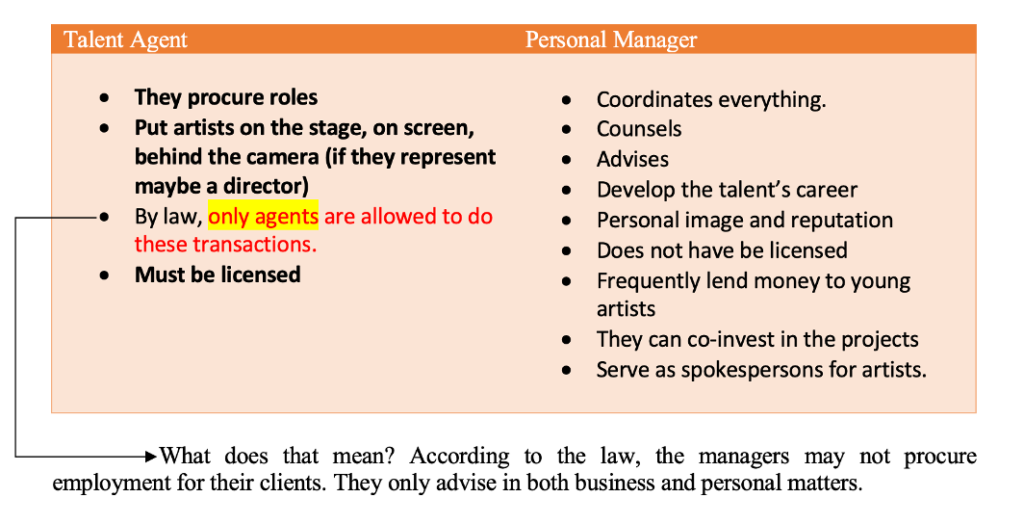Navigating the entertainment industry can be a complex endeavor, particularly for emerging talents who must balance their artistic pursuits with the business aspects of their careers. One critical piece of legislation that aims to protect artists in this realm is the Talent Agency Act (TAA). Established in 1978, the TAA is housed within the California Labor Code and is designed to regulate the activities of talent agents, ensuring the protection of artists and fair labor practices.
The Role of Talent Agents
Talent agents act as intermediaries between artists and those seeking to hire them, such as studios, concert promoters, or sports teams. They are responsible for negotiating employment contracts and securing job opportunities for their clients. Unlike personal managers, who advise and guide the overall career and personal image of an artist, talent agents focus on specific, often short-term engagements.
There are 2 groups of people who represent talents: Agents and managers. And the Talent Agency Act regulates the agents.
Talent Agency Act does not regulate
- Talents
- Lawyers
- Managers
- Studios or other people or entities which hire talents.
Talent agent is not personal manager! This can confuse people most of the time. To speak general, talent agent is a different person than the personal manager.
According to the California Supreme Court, talent agents are the only professionals legally permitted to procure employment for artists. This distinction is critical and often misunderstood. Personal managers, while vital to an artist’s career, are not authorized by law to find employment for their clients. Instead, their role encompasses counseling, advising, and developing the talent’s career without the need for a license.

Key Responsibilities of Talent Agents:
1. Procurement of Employment:Talent agents secure roles for artists, whether on stage, on screen, or behind the camera.
2. Licensing: Agents must be licensed and their contracts approved by the State Labor Commissioner to ensure fairness.
3. Negotiation: Agents negotiate terms such as duration, territory, and industry-specific commissions.
4. Financial Management: Agents handle funds received on behalf of talents, ensuring timely distribution after deducting their commission.
5. Compliance with Labor Laws: Agents must adhere to strict guidelines, including avoiding conflicts of interest and ensuring the safety and welfare of their clients.
The Talent Agency Act in Practice
The Talent Agency Act stipulates that all talent agencies in California must be licensed by the State Labor Commissioner. This process includes submitting a proposed agency contract and fee schedule for approval to ensure the terms are not “unfair, unjust, or oppressive” to the artist. Here are some of the primary components and protections provided under the TAA:
| Contract Provisions: |
| Term and Duration: The length of the agreement must be specified, whether it’s for a single project or several years. |
| Territory and Industry: The agreement must outline the geographic and industry scope. |
| Commission Percentages: Typically, agents in film and TV can charge up to 10% of the artist’s earnings, though this can vary by industry. |
| Post-Term Commissions: Agents may continue to earn commissions on projects they secured for the artist even after the contract term ends, unless a sunset provision is included. |
| Termination Provisions: Contracts must allow for clear terms of termination and state that agents can represent other artists as well. |
Enforcement and Dispute Resolution:
Exclusive Jurisdiction: The California Labor Commissioner has exclusive jurisdiction over disputes between talent agents and artists.
Arbitration: Union and guild collective bargaining agreements may include arbitration clauses, with the Labor Commissioner reserving the right to attend any arbitration.
Fee Splitting: Unauthorized fee splitting between agents and studios is prohibited to avoid conflicts of interest.
Blurred Lines: Agents vs. Managers
In practice, the lines between the roles of agents and managers can become blurred. While legally distinct, agents sometimes perform duties typically associated with managers, such as providing career advice and support. Conversely, managers occasionally find employment opportunities for their clients, which is technically beyond their legal scope. This overlap can lead to disputes, particularly if a manager steps into an agent’s role, risking contract voidance and commission forfeiture.
Fiduciary Duties of Talent Agents
Talent agents hold a fiduciary role, meaning they have a legal obligation to act in their clients’ best interests. This includes:
- Duty of Care: Acting diligently and competently on behalf of the client.
- Duty of Loyalty: Prioritizing the client’s interests over their own potential earnings.
- Duty of Confidentiality: Protecting the client’s private information, even after the end of their professional relationship.
- Duty of Notification: Keeping the client informed of all relevant developments.
- Duty of Obedience: Following the client’s directives and priorities.
- Duty of Accounting: Properly managing the client’s funds and maintaining separate trust accounts for each client.
Special Considerations for Minors and Immigration
The TAA includes additional protections for minors, requiring court approval for their contracts and prohibiting their engagement in environments where alcohol is present. Additionally, talent agencies often act as petitioners for artists requiring visas to work in the United States, necessitating formal agency agreements to satisfy immigration requirements.
Conclusion
The Talent Agency Act plays a crucial role in regulating the entertainment industry in California, safeguarding artists from exploitative practices and ensuring fair treatment by talent agents. Understanding the distinctions between agents and managers, the fiduciary responsibilities of agents, and the legal requirements for contracts can help artists and industry professionals navigate their careers more effectively. For any artist entering the entertainment industry, knowledge of the TAA is not just beneficial but essential for ensuring their rights and interests are protected.



